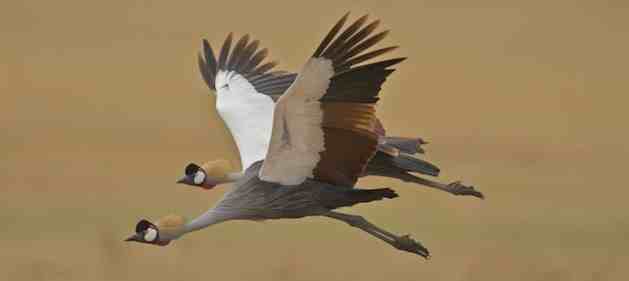
Since I was a young girl, conversations with dad were more often than not interrupted by him raising his hand like a stop sign and announcing with great importance, “Listen, there’s a black-throated blue warbler,” or some such name. Cocking his ear toward the noise, and pursing his lips he would call out “pish, pish, pish,” hoping to entice the bird closer. A birder’s universal call, this sound can be perfected by studying The Art of Pishing, (audio CD included) by Pete Dune. A copy of it, along with What Bird Did That? pictures of windshield bird splats accompanied by detailed descriptions of color, contents, and consistency – are among the hundred or so birding books my father owns.
Birding People
There are two kinds of people who sign up for an African safari. Most, myself included, want to see “The Big Five”— lion, leopard, rhino, buffalo, and elephant. The other people are… the birders. So when my father announces he wants to join me on a trip to Africa I have planned for myself, I am delighted, but feel I must clarify, “Dad, you know this is not a birding trip.”
“Fine by me,” he replies, “I won’t even mention my interest in birds to anyone so I don’t interfere with any part of your plans.”
True to his word, for the first part of our journey anyway, he doesn’t mention birds. He doesn’t need to. My dad is never without a pair of binoculars hanging from his neck, and a pencil and local bird list sticking out of his back pocket, ready to identify any flying species.
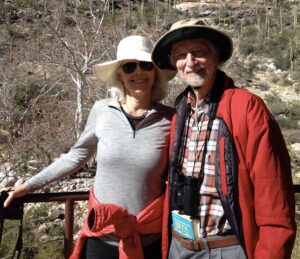
At our first stop, we meet up with a group of my friends at a private reserve near Kruger National Park.
“Where is your father?” quickly becomes the group’s mantra, and I am sure to find him, off on his own, whispering into the microphone the identifying characteristics of the bird species he’s filming. In the Northern Transvaal, my friends and I climb among rock cliffs where we discover fresh leopard prints in the sand. Meanwhile, my dad, wearing his favorite one-size-too-large-for-him khaki hat, stalks lanner falcons, red-breasted hornbills, and grey louries.
The group cooks stew and bread in a three-legged “pokipot” over an open fire under the stars while our guide talks about the history of the area, and my dad checks off boxes on his birding list. He is especially excited by “lifers;” those birds he has never seen before.
Birding vs the big five
For the most anticipated part of my itinerary, dad and I fly alone to Botswana to visit two different lodges chosen because of their large populations of my favorite animals – cats and elephants.
Wrapped in blankets against the 5:30 a.m. chill, we climb into the open Land Rover for our first wildlife drive. Impatient to get into the bush, I hardly hear Tim, our driver/guide, recite the dos and donts of safari etiquette.
Finally, Tim finishes his diatribe. “So let’s push off,” he says.
“Yes,” I concur, with an enthusiastic clap of my hands.
But before he starts the engine, he turns toward my father and me in the back seat and asks, “Are either of you birders?”
Why… do they always ask that?
“I’m not. I want to focus on mammals, especially lions and elephants,” I respond with an I’m-in-charge attitude, hoping Tim realizes I am speaking for my father and myself.
Then my father murmurs something about… “birder, “ followed by: “But this is my daughter’s trip and I don’t want to ruin it for her, so let’s focus on large animals.”
As I’m thinking how sweet it is of my dad to say this, I hear him add, “But if we see a bird or two that would be great.” A bird or two? Is he joking? Birds are everywhere, they’re inescapable.
Tim’s face lights up as if he just caught up with a long-lost friend, “Oh wonderful, I’m a birder too,” he says. From the detail with which Tim and his new best buddy then compare binoculars, I realize I’m doomed.
A few minutes into our drive we stop. I scan the area but see nothing. Tim points as I catch a glimpse of purple, green, yellow, orange, and blue feathers shimmering in the first morning light. This is a beautiful bird, I admit to myself.
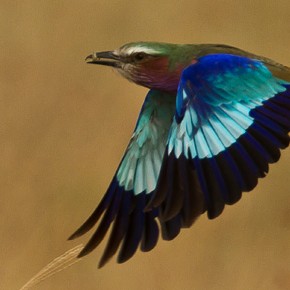
The lilac-breasted roller is a lifer for my father, and he wants to see the male roll earthward from the sky in his mating dance.
During our two-hour drive, we stop more than a school bus full of kids. We halt and stare at every brown, blue, yellow, big, little, flying, and sitting bird. I listen to discussions of wing spans, beak shapes, and throat colors, and I learn new names like Hammerkop and Bateleur.
An hour and a half, and twelve lilac-breasted roller sightings (among many other bird species) later, we see a pride of seven lions, sleeping belly up, their baseball mitt-size paws facing the sky.
Finally! I rest my elbows on the edge of the vehicle’s door focusing my father’s hand-me-down pair of binoculars on their blood-stained, fly-covered fur. I’m rivited by the lions twitching whiskers, and their full bellies moving up and down with each breath.
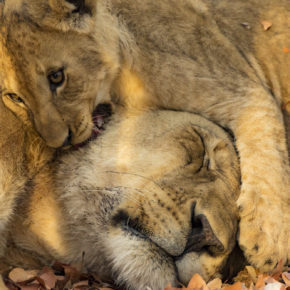
After a few minutes, Tim interrupts my big cat trance, “They aren’t going to do anything, so let’s push onward.”
So we can find some more birds which are doing so much, I think to myself. I would rather spend the rest of the day watching these lions sleep.
It’s All about Elephants
Our remaining four wildlife drives at Chitabe Camp follow the same pattern. My need to see anything larger than an eagle is accommodated but lacks the obvious enthusiasm that accompanies any and all bird sightings. I have practically become a birder myself by osmosis alone, so at our next lodge, with only two days left before we go home, I am not taking any chances. I explain to my father, “It is probably obvious by the name of the lodge, “Savute Elephant Camp” that I really want to focus on elephants here.”
“Yes, of course,” he agrees.
For added assurance I find a private guide to lead us on a big-game walking experience.
“We have no interest in seeing birds,” I tell Clive when I hire him. He mentions a rogue bull elephant in the area. “We will try to find him,” he says.
“Perfect.” This man has my interests in mind.
In the single file I follow Clive and the shotgun slung over his right shoulder; my father behind me. When we catch up to the massive grey young bull, Clive’s hand motions us to go slow, be quiet, and stay close.
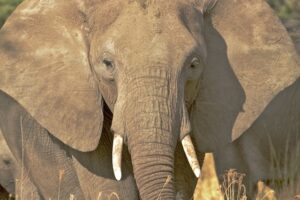
He whispers, “Adolescent male elephants are ousted from the matriarchal herd to find a new group where they can mate, so they can be unpredictable and dangerous.”
Clive’s hand signals us to stop; any further and we would be too close for comfort. The bull moves from one mopane tree to the next, snapping branches like twigs and stripping the red leaves, seemingly oblivious to his audience of three. As I turn to share this adrenaline-pumping moment with my dad, he is nowhere in sight, and the massive creature begins to walk away.
“We can’t follow the elephant until we find your father; I don’t want him getting lost out here,” Clive insists.
I see my father in the distance, half hidden behind a thick bush, a video camera leading him in the opposite direction from the elephant and us. His lens is focused on a tree branch, on top of which sits a lilac-breasted roller.
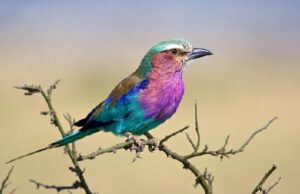
Catching up to him, I plead, “Dad, you have seen hundreds of lilac-breasted rollers already, please can you walk with us, the elephant’s getting away.”
“You’ve seen a hundred elephants already,” he retaliates. We stare at each other for a tension-filled moment, and then we both start to laugh. The noise startles the bird and it flies off, while the elephant disappears into the thick bush.

Back home in the States, I unwrap a gift my father has sent as a thank-you for including him on my African journey. It’s a two-by-three-foot size poster of a lilac-breasted roller.
3 Replies to “Birding Africa – A Father/Daughter Trip”
Comments are closed.

Laughing out loud reading this. As Africa lovers, are we destined to become birders?
I am so glad you got some laughs from my story. And, yes, I think all of us animal lovers will eventually become birders. Especially if you spend time in Africa or Australia or New Zealand where some of the most unique and beautiful birds live. Thank you for commenting.
Love this! Your writing brings it all to life. So touching and delightful to read.